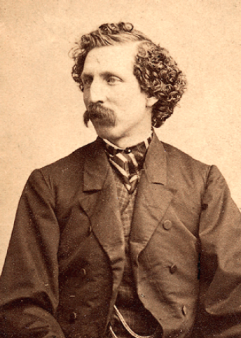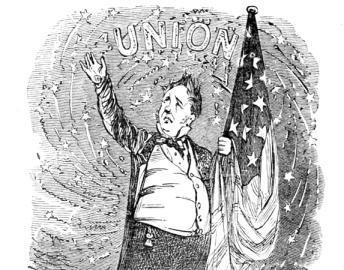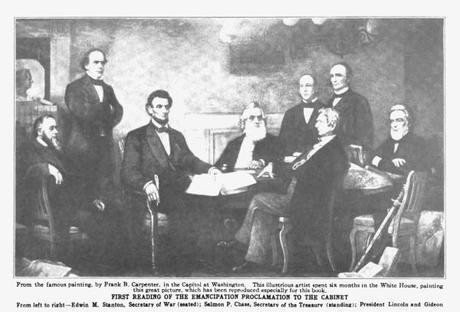
“So a priest, a rabbi, and a Zulu walk into a bar…”
All history is a reconstruction. “Strictly speaking,” to quote Oxford, “a history is a work in which each movement, action, or chain of events is dealt with as a whole and pursued to its natural termination or to a convenient stopping place, as distinct from annals, in which events are simply recorded in divisions of a year or other limited period, or a chronicle, in which events are presented as a straightforward continuous narrative.”
But what naturally terminates? To quote another reputable source: “Even Old New York was once New Amsterdam…” But if people just liked it better that way, they did not feel any need to change the rest of their amoral den of lewdinous vice and narcotic idolatry. Give it a new name to please King Chuck 2 and leave us to our Wall Street whoremongering.
But I digress. If we construct natural terminations then history is made. Fingo, fingĕre, finxī, fictum: Latin “to form.” We fashion a consensus of what happened, why it happened, and (when necessary) how it had to happen thus. A fiction, but one we all agree upon. Once upon a time, the great Bruce Campbell replied to an email of mine railing against the liberties Xena: Warrior Princess took upon the Homeric Canon: “Yes, but aren’t stories the greatest teachers of mankind?” was his Aristotelian reply.
Homer would agree. Again I digress. I had wanted to call this piece “Abraham Lincoln and the Emancipation Digression,” but given Mr. Lincoln’s important place in history and the cinema, I think it matters more that it ends in “Diversion.” All diversions are digressions, but not all digressions are diversions. I’ll spare you the definitions if you spare me your time and complete attention. I’ve reconstructed the following from several sources, but the primary anecdote belongs to Edwin Stanton (Lincoln’s Secretary of War), and comes from Wayne Whipple’s “The Story-Life of Lincoln” (1908), who found it some place else. I’ll come back at the end in distinguishing CAPS.
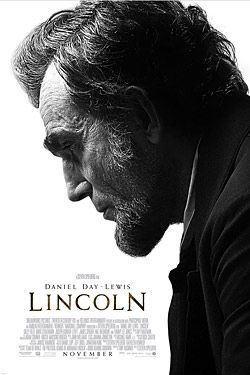
“One of the funniest %@!# movies I’ve ever seen!” Richard Roeper …on another movie.
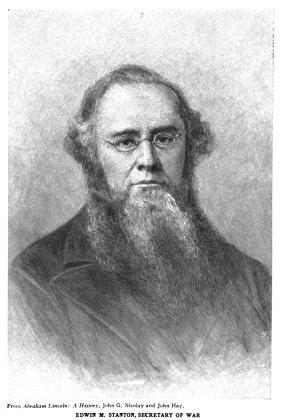
Edwin Stanton: just as funny as he looks.
“I was more discouraged after Antietam than at any other period, and the future seemed more obscure to me then than at any previous time. But I kept on my daily work, and on the 22nd of September, 1862, I had a sudden and peremptory call to a Cabinet meeting at the White House. They did not usually require me to attend meetings, as my duties were so exacting.
“I had to be constantly at my post, and it was only on rare and important occasions that I was called to such meetings. I went immediately to the White House, entered the room and found the historic War Cabinet of Abraham Lincoln assembled, every member being present. The President hardly noticed me as I came in. He was reading a book of some kind, which seemed to amuse him. It was a little book. He finally turned to us and said:
“ ‘Gentlemen, did you ever read anything from Artemus Ward? Let me read you a chapter that is very funny.’
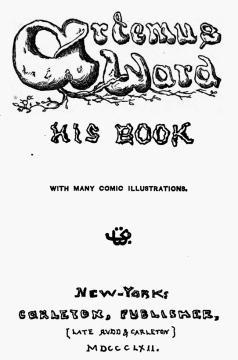
“Not a member of the Cabinet smiled; as for myself I was angry, and looked to see what the President meant.”
HIGH-HANDED OUTRAGE AT UTICA.
In the Faul of 1856, I showed my show in Utiky, a trooly grate sitty in the State of New York.
The people gave me a cordyal recepshun. The press was loud in her prases.
1 day as I was givin a descripshun of my Beests and Snaiks in my usual flowry stile what was my skorn & disgust to see a big burly feller walk up to the cage containin my wax figgers of the Lord’s Last Supper, and cease Judas Iscarrot by the feet and drag him out on the ground. He then commenced fur to pound him as hard as he cood.
“What under the son are you abowt?” cried I.
Sez he, “What did you bring this pussylanermus cuss here fur?” & he hit the wax figger another tremenjis blow on the hed.
Sez I, “You egrejus ass, that air’s a wax figger—a representashun of the ’Postle.”
Sez he, “That’s all very well fur you to say but I tell you, old man, that Judas Iscarrot can’t show hisself in Utiky with impunerty by a darn site!” with which observashun he kaved in Judassis hed. The young man belonged to 1 of the first famerlies in Utiky. I sood him, and the Joory brawt in a verdick of Arson in the 3d degree.
“It seemed to me like buffoonery. He, however, concluded to read us a chapter from Artemus Ward, which he did with great deliberation. Having finished, he laughed heartily without a member of the Cabinet joining in the laughter.
“ ‘Well,’ he said, ‘let’s have another chapter,’ and he read another chapter, to our great astonishment.”
CELEBRATION AT BALDINSVILLE IN HONOR OF THE ATLANTIC CABLE.
Baldinsville, Injianny, Sep the onct, 18&58.—I was summund home from Cinsinnaty quite suddin by a lettur from the Supervizers of Baldinsville, sayin as how grate things was on the Tappis in that air town in refferunse to sellebratin the compleshun of the Sub-Mershine Tellergraph & axkin me to be Pressunt. Lockin up my Kangeroo and wax works in a sekure stile I took my departer for Baldinsville—“my own, my nativ lan,” which I gut intwo at early kandle litin on the follerin night & just as the sellerbrashun and illumernashun ware commensin.
Will the real Artemus Ward…
…please stand up?
Baldinsville was trooly in a blaze of glory. Near can I forgit the surblime speckticul which met my gase as I alited from the Staige with my umbreller and verlise. The Tarvern was lit up with taller kandles all over & a grate bon fire was burnin in frunt thareof. A Transpirancy was tied onto the sine post with the follerin wurds—“Giv us Liberty or Deth.” Old Tompkinsis grosery was illumernated with 5 tin lantuns and the follerin Transpirancy was in the winder—“The Sub-Mershine Tellergraph & the Baldinsville and Stonefield Plank Road—the 2 grate eventz of the 19th centerry—may intestines strife never mar their grandjure.” Simpkinsis shoe shop was all ablase with kandles and lantuns. A American Eagle was painted onto a flag in a winder—also these wurds, viz—“The Constitooshun must be Presarved.” The Skool house was lited up in grate stile and the winders was filld with mottoes amung which I notised the follerin—“Trooth smashed to erth shall rize agin—YOU CAN’T STOP HER.” “The Boy stood on the Burnin Deck whense awl but him had Fled.” “Prokrastinashun is the theaf of Time.” “Be virtoous & you will be Happy.” “Intemperunse has cawsed a heap of Trubble—shun the Bole,” an the follerin sentimunt written by the skool master, who graduated at Hudson Kollige. “Baldinsville sends greetin to Her Magisty the Queen, & hopes all hard feelins which has heretofore previs bin felt between the Supervizers of Baldinsville and the British Parlimunt, if such there has been, may now be forever wiped frum our Escutchuns. Baldinsville this night rejoices over the gerlorious event which sementz 2 grate nashuns onto one anuther by means of a elecktric wire under the roarin billers of the Nasty Deep. QUOSQUE TANTRUM, A BUTTER, CATERLINY, PATENT NOSTRUM!” Squire Smith’s house was lited up regardlis of expense. His little sun William Henry stood upon the roof firin orf crackers. The old ’Squire hisself was dressed up in soljer clothes and stood on his door-step, pintin his sword sollumly to a American flag which was suspendid on top of a pole in frunt of his house. Frequiently he wood take orf his cocked hat & wave it round in a impressive stile. His oldest darter Mis Isabeller Smith, who has just cum home from the Perkinsville Female Instertoot, appeared at the frunt winder in the West room as the goddis of liberty, & sung “I see them on their windin way.” Booteus 1, sed I to myself, you air a angil & nothin shorter. N. Boneparte Smith, the ’Squire’s oldest sun, drest hisself up as Venus the God of Wars and red the Decleration of Inderpendunse from the left chambir winder. The ’Squire’s wife didn’t jine in the festiverties. She sed it was the tarnulest nonsense she ever seed. Sez she to the ’Squire, “Cum into the house and go to bed you old fool, you. Tomorrer you’ll be goin round half-ded with the rumertism & won’t gin us a minit’s peace till you get well.” Sez the ’Squire, “Betsy, you little appresiate the importance of the event which I this night commemerate.” Sez she, “Commemerate a cat’s tail—cum into the house this instant, you pesky old critter.” “Betsy,” sez the ’Squire, wavin his sword, “retire.” This made her just as mad as she could stick. She retired, but cum out agin putty quick with a panfull of Bilin hot water which she throwed all over the ’Squire, & Surs, you wood have split your sides larfin to see the old man jump up and holler & run into the house. Except this unpropishus circumstance all went as merry as a carriage bell, as Lord Byrun sez. Doctor Hutchinsis offiss was likewise lited up and a Transpirancy on which was painted the Queen in the act of drinkin sum of “Hutchinsis invigorater,” was stuck into one of the winders. The Baldinsville Bugle of Liberty noospaper offiss was also illumernated, & the follerin mottoes stuck out—“The Press is the Arkermejian leaver which moves the world.” “Vote Early.” “Buckle on your Armer.” “Now is the time to Subscribe.” “Franklin, Morse & Field.” “Terms $1,50 a year—liberal reducshuns to clubs.” In short the villige of Baldinsville was in a perfect fewroar. I never seed so many peple thar befour in my born days. Ile not attemp to describe the seens of that grate night. Wurds wood fale me ef I shood try to do it. I shall stop here a few periods and enjoy my “Oatem cum dig the tates” as our skool master observes, in the buzzum of my famerly, & shall then resume the show bisnis, which Ive bin into twenty-two (22) yeres and six (6) months.
“I was considering whether I should rise and leave the meeting abruptly, when he threw his book down, heaved a long sigh, and said:
“ ‘Gentlemen, why don’t you laugh? With the fearful strain that is upon me night and day, if I did not laugh I should die, and you need this medicine as much as I do.’
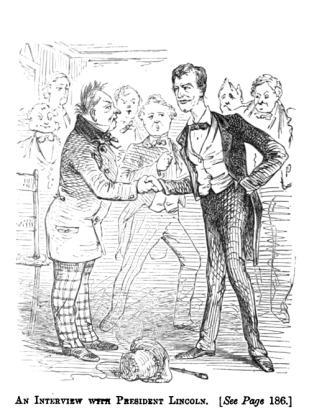
When Ward presumably met Lincoln: a convergence of genius in the same book (different chapter).
“He then put his hand in his tall hat that sat upon the table, and pulled out a little paper. Turning to the members of the Cabinet, he said:
“ ‘Gentlemen, I have called you here upon very important business. I have prepared a little paper of much significance. I have made up my mind that this paper is to issue; that the time is come when it should issue; that the people are ready for it to issue. It is due to my Cabinet that you should be the first to hear and know of it, and if any of you have any suggestions to make as to the form of this paper or its composition, I shall be glad to hear them. But the paper is to issue.’ ”
By the President of the United States of America.
A Proclamation.I, Abraham Lincoln, President of the United States of America, and Commander-in-Chief of the Army and Navy thereof, do hereby proclaim and declare that hereafter, as heretofore, the war will be prosecuted for the object of practically restoring the constitutional relation between the United States, and each of the States, and the people thereof, in which States that relation is, or may be, suspended or disturbed.
That it is my purpose, upon the next meeting of Congress to again recommend the adoption of a practical measure tendering pecuniary aid to the free acceptance or rejection of all slave States, so called, the people whereof may not then be in rebellion against the United States and which States may then have voluntarily adopted, or thereafter may voluntarily adopt, immediate or gradual abolishment of slavery within their respective limits; and that the effort to colonize persons of African descent, with their consent, upon this continent, or elsewhere, with the previously obtained consent of the Governments existing there, will be continued.
That on the first day of January in the year of our Lord, one thousand eight hundred and sixty-three, all persons held as slaves within any State, or designated part of a State, the people whereof shall then be in rebellion against the United States shall be then, thenceforward, and forever free; and the executive government of the United States, including the military and naval authority thereof, will recognize and maintain the freedom of such persons, and will do no act or acts to repress such persons, or any of them, in any efforts they may make for their actual freedom.
That the executive will, on the first day of January aforesaid, by proclamation, designate the States, and part of States, if any, in which the people thereof respectively, shall then be in rebellion against the United States; and the fact that any State, or the people thereof shall, on that day be, in good faith represented in the Congress of the United States, by members chosen thereto, at elections wherein a majority of the qualified voters of such State shall have participated, shall, in the absence of strong countervailing testimony, be deemed conclusive evidence that such State and the people thereof, are not then in rebellion against the United States.
That attention is hereby called to an Act of Congress entitled “An Act to make an additional Article of War” approved March 13, 1862, and which act is in the words and figure following:
“Be it enacted by the Senate and House of Representatives of the United States of America in Congress assembled, That hereafter the following shall be promulgated as an additional article of war for the government of the army of the United States, and shall be obeyed and observed as such:
“Article-All officers or persons in the military or naval service of the United States are prohibited from employing any of the forces under their respective commands for the purpose of returning fugitives from service or labor, who may have escaped from any persons to whom such service or labor is claimed to be due, and any officer who shall be found guilty by a court martial of violating this article shall be dismissed from the service.
“Sec.2. And be it further enacted, That this act shall take effect from and after its passage.”
Also to the ninth and tenth sections of an act entitled “An Act to suppress Insurrection, to punish Treason and Rebellion, to seize and confiscate property of rebels, and for other purposes,” approved July 17, 1862, and which sections are in the words and figures following:
“Sec.9. And be it further enacted, That all slaves of persons who shall hereafter be engaged in rebellion against the government of the United States, or who shall in any way give aid or comfort thereto, escaping from such persons and taking refuge within the lines of the army; and all slaves captured from such persons or deserted by them and coming under the control of the government of the United States; and all slaves of such persons found on (or) being within any place occupied by rebel forces and afterwards occupied by the forces of the United States, shall be deemed captives of war, and shall be forever free of their servitude and not again held as slaves.
“Sec.10. And be it further enacted, That no slave escaping into any State, Territory, or the District of Columbia, from any other State, shall be delivered up, or in any way impeded or hindered of his liberty, except for crime, or some offense against the laws, unless the person claiming said fugitive shall first make oath that the person to whom the labor or service of such fugitive is alleged to be due is his lawful owner, and has not borne arms against the United States in the present rebellion, nor in any way given aid and comfort thereto; and no person engaged in the military or naval service of the United States shall, under any pretense whatever, assume to decide on the validity of the claim of any person to the service or labor of any other person, or surrender up any such person to the claimant, on pain of being dismissed from the service.”
And I do hereby enjoin upon and order all persons engaged in the military and naval service of the United States to observe, obey, and enforce, within their respective spheres of service, the act, and sections above recited.
And the executive will in due time recommend that all citizens of the United States who shall have remained loyal thereto throughout the rebellion, shall (upon the restoration of the constitutional relation between the United States, and their respective States, and people, if that relation shall have been suspended or disturbed) be compensated for all losses by acts of the United States, including the loss of slaves.
In witness whereof, I have hereunto set my hand, and caused the seal of the United States to be affixed.
“And to my astonishment, he read the Emancipation Proclamation of that date, which was to take effect the first of January following, containing the vital provision that on January 1, 1863, all persons held as slaves within any State or designated part of a State, the people whereof shall be in rebellion against the United States, shall be then henceforward and forever free.
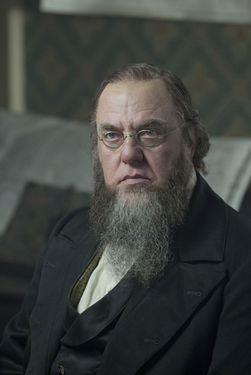
Bruce McGill as Stanton in “Lincoln” (2012), acting calm.
“I have alwavs tried to be calm, but I think I lost my calmness for a moment, and with great enthusiasm I arose, approached the President, extended my hand and said:
“ ‘Mr. President, if the reading of chapters of Artemus Ward is a prelude to such a deed as this, the book should be filed among the archives of the nation, and the author should be canonized. Henceforth I see the light and the country is saved.’ And all said ‘Amen.’
“And Lincoln said to me in a droll way, just as I was leaving, ‘Stanton, it would have been too early last spring.’
“And as I look back upon it I think the President was right.”
YES HE WAS, MR. STANTON. YES HE WAS. WISHING MR. ABRAHAM LINCOLN A HAPPY 204th BIRTHDAY, AND SUCCESS AT THE OSCARS. AND A HAPPY SESQUICENTENNIAL TO THE EMANCIPATION PROCLAMATION. TO QUOTE AN ACTUAL AMERICAN TOURIST OVERHEARD AT THE LINCOLN MEMORIAL, WHEN HIS KIDS ASKED WHY THEY BUILT THE MONUMENT: “WELL, ABRAHAM LINCOLN GAVE A VERY FAMOUS SPEECH AT THIS VERY SPOT WHERE HE SAID, ‘FREE AT LAST! FREE AT LAST! THANK GOD ALMIGHTY, LET MY PEOPLE GO!’ ”
TRUE STORY.
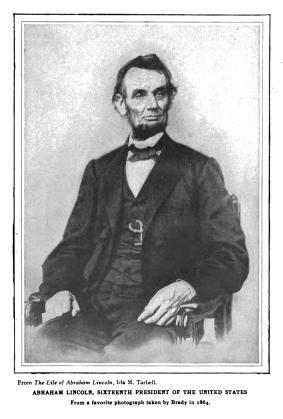
“Pull my finger.”
